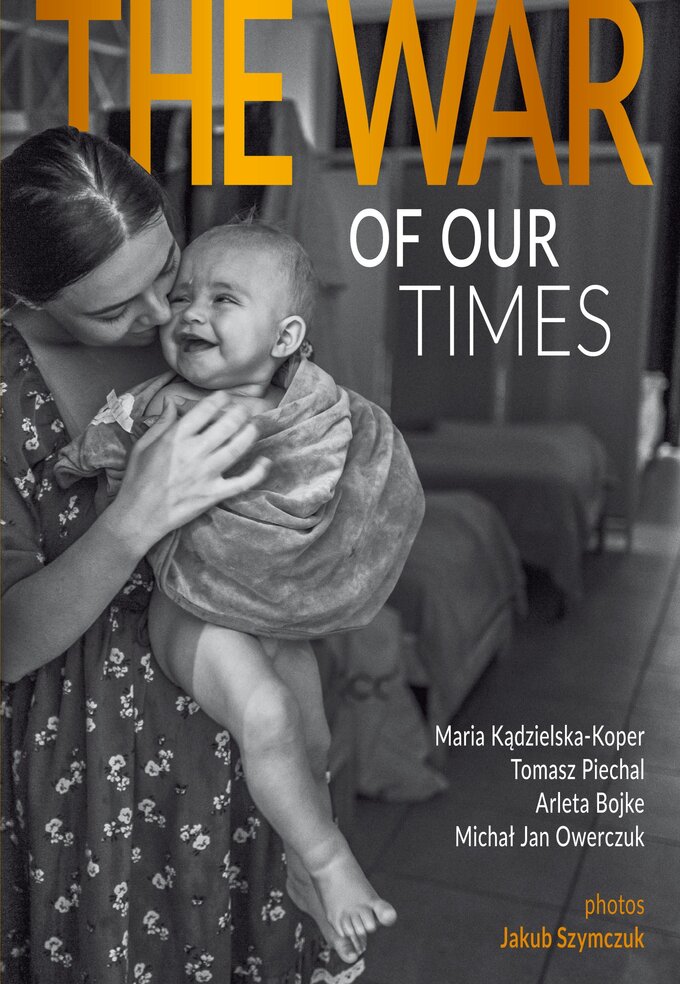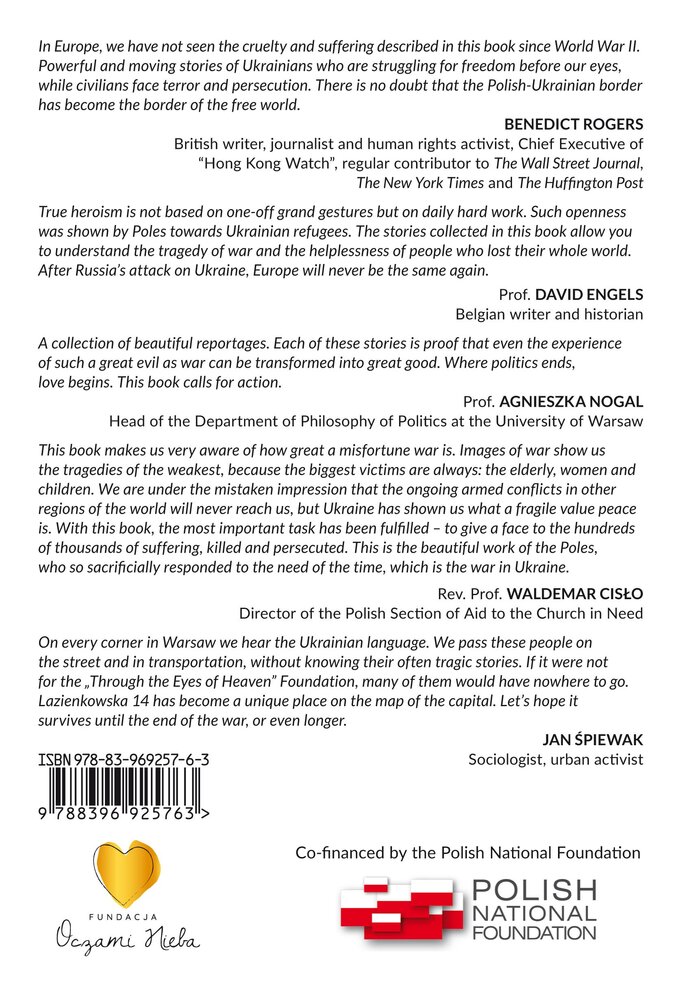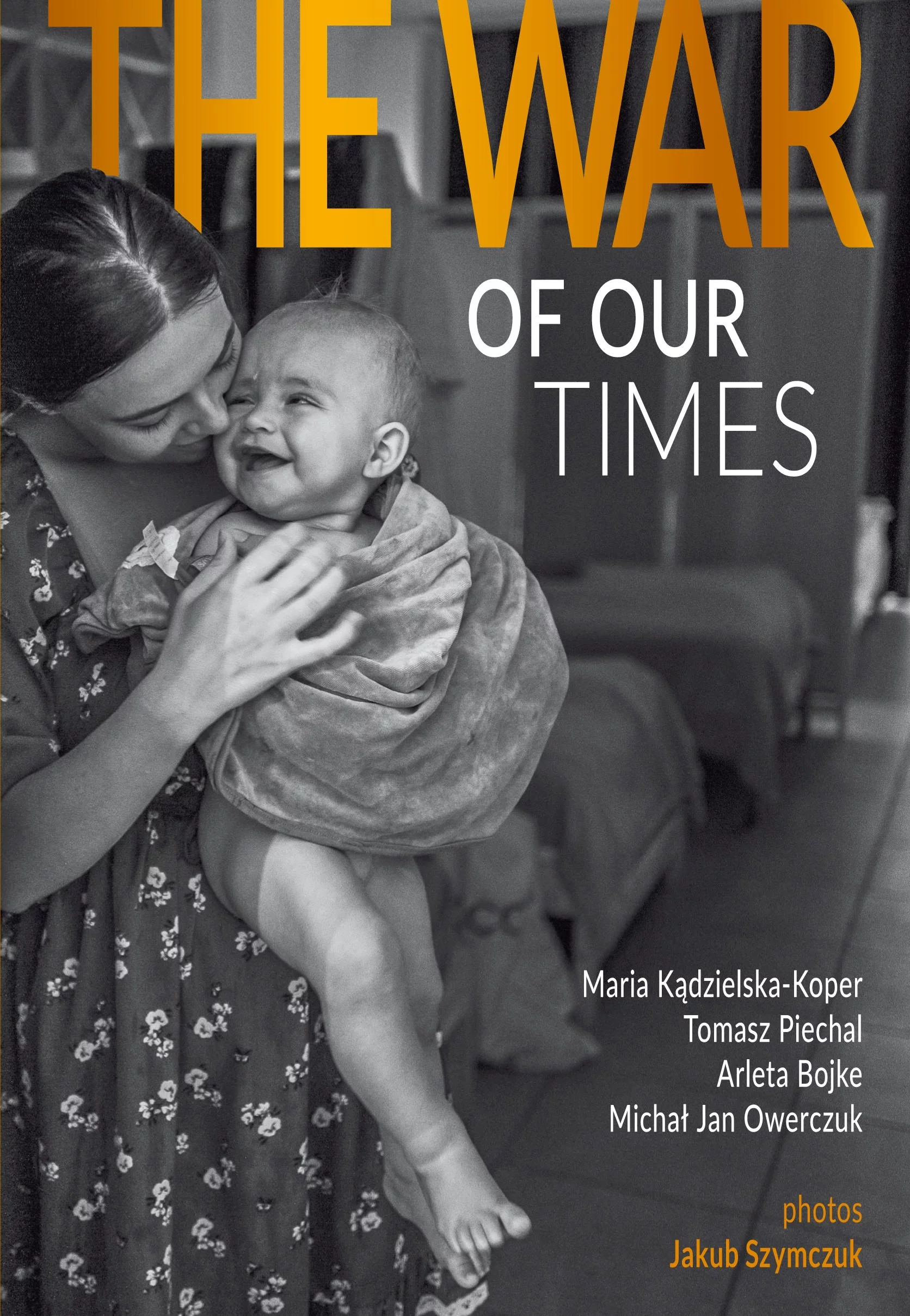W formie ebooka ukazała się właśnie anglojęzyczna książka „War of Our Times”, która opisuje polską pomoc na rzecz ukraińskich uchodźców. Wydarzenia z dwóch lat wojny widzimy oczami różnych bohaterów – zarówno Ukraińców jak i Polaków, w formie czternastu reportaży czterech autorów: Marii Kądzielskiej-Koper, Arlety Bojke, Tomasza Piechala i Michała Jana Owerczuka, w tłumaczeniu Agnieszki Żelazowskiej-Rogowiec. Reportażyści poniekąd prześcigają się, kto z nich bardziej wzruszy czytelnika. W książce opisywane są historie rosyjskich tortur, proceder uprowadzania ukraińskich dzieci, życie na terenach okupowanych, czy warunki, w jakich znaleźli się uprowadzeni przez Rosjan ukraińscy żołnierze. To, co łączy wszystkie rozdziały, to fakt, że każdy z bohaterów w pewnym momencie trafił na Łazienkowską 14 w Warszawie, do noclegowni prowadzonej przez fundację „Oczami Nieba”. Autorzy opisali także historie wolontariuszy, który prowadzili to miejsce pomocy, zlokalizowane w dolnym kościele Wspólnot Jerozolimskich przez ponad półtora roku.
Polska pomoc na rzecz ukraińskich uchodźców jest z pewnością wyjątkowa na skalę światową. Teraz o jej szczegółach, z perspektywy zwykłych ludzi, ale też aktorów – książka zawiera wywiad Michałem Koterskim, Rafałem Mroczkiem i Cezarym Łukaszewiczem, będą mogli przeczytać czytelnicy na całym świecie. Wydaje się, że jest to trochę wizytówka polskości, której brakowało. Miejmy nadzieję, że pierwsza z wielu następnych. Publikację poleca na okładce m.in. Benedict Rogers, doradca brytyjskiego parlamentu do spraw łamania praw człowieka w Chinach oraz prof. David Engels, belgijski pisarz i historyk.
Bez wątpienia jednym z bardziej wzruszających elementów tej publikacji są czarno-białe zdjęcia Jakuba Szymczuka, wieloletniego fotografa prezydenta RP, który sportretował codzienności noclegowni na Łazienkowskiej 14 oraz twarze uchodźców. O łzy w oczach i ściśnięte gardło mogą nas też przyprawić same cytaty otwierające rozdziały, w jednym z nich czytamy: „Ludzie, którzy trafiali do Noclegowni, stracili swoich bliskich i dach nad głową. Chociaż serce pękało mi od każdej nowo poznanej historii, byłam szczęśliwa, że mogę choć trochę im pomóc. Oddać dobro, którego sama doświadczyłam. W tych trudnych czasach to jest niezwykle ważne. Dobro wraca i przypomina mi, że żyje się po coś” – relacjonuje Michał Jan Owerczuk w rozdziale „Sztuka wolności”.
Specjalnie dla DoRzeczy.pl udostępniamy niepublikowany w innych mediach fragment książki z rozdziału „Irma – historia Anastazji” Tomasza Piechala:
„The Russians occupied our village on the second day of the war. We weren’t prepared for such a situation… We didn’t have any excess supplies, just some food in the fridge, some tinned goods and jars of pickled vegetables. And there were two women on board – my mother managed to turn back from Kyiv and was with us – two children and three dogs… By then, we had managed to distribute most of the dogs from the litter, but Irma and her last two puppies remained… There was very little food…
At first, we tried not to leave the house during the day, only at night… At night, when they were shooting the most, we would go to the nearby forest. The end of February, frost, snow… All of us covered with blankets, rugs, in jackets, hidden between the trees… Us and the neighbors… People and dogs… In this darkness and cold… We decided the trees in the forest would best stop the shrapnel of the exploding shells…
For the first few days, the Russians didn’t appear in our part of the village. My mother’s house stands out of the way, a bit further away from the main buildings. We knew the soldiers were present in the village, that they had occupied the surrounding areas, and that the area was under their control. At the time, however, we hadn’t encountered them yet. In the beginning, my mother even tried to leave the house to find a signal and call our relatives, but then it became too dangerous.
Slowly, hunger began to set in as well… There was no way to get food. Also, we didn’t know how long this situation would last, so we started rationing our food… We gave ourselves as little as possible, a bit more to the children, and as for the dogs… There wasn’t enough for them. They were hungry, whimpering, but we had nothing to give them… We started starving ourselves… Hunger is a terrible thing. Hunger when you have nowhere to get food from…
After a few such days of starvation, Irma disappeared. When she came back, I saw that she was holding an animal in her bloodied muzzle… Maybe it was a cat, perhaps a smaller dog… Her survival instinct must have kicked in; after all, no one had trained her for this. She went hunting by herself and brought the kill for her puppies… How they went at the meat… They tore the creature apart, and their mouths were covered in blood… Irma stood by; she didn’t eat anything, she gave everything to her puppies… My mother and I looked at it and cried…
That was when I realized I had to try and do something. I left the house in the afternoon and crept to the village center, to the shop. The door was broken, and the window was smashed. There was hardly anything left inside. I later found out that a few days earlier the shop had been looted by Russian soldiers. They had ransacked everything and taken almost everything that could be eaten. However, some food and drink were left, some things were overlooked, fell out in their haste… I took what I could, the remnants, and started to return home. It was already dark, a February afternoon, almost evening. I walked as if in lethargy, with my bags and a bottle of water in the pocket of my jacket.
I was semi-conscious from hunger, experiencing problems with concentration and orientation… At one moment, I heard the sound of an approaching machine behind me. Grenades also exploded, emitting smoke that completely restricted any visibility. I stopped and began to gaze at the light that appeared in the fog. I thought it was a car. Only at the last moment did I realize that a tank was speeding toward me. I turned around and tried to escape somehow, but I didn’t make it… I felt a blow to my back… I fell to the ground… I heard a crunch and felt my back and side explode with pain… It was all fractions of a second. For the first few minutes, I was lying all sore in the mud and the darkness… I tried somehow to roll over on my side, to get up… I started to check what had happened to me when I felt something wet under my hand… At first, I thought it was blood… However, I quickly realized it was water from the bottle in the pocket of my jacket… The bottle was completely crushed; it had been run over by the tank track… It dawned on me that centimeters, maybe millimeters, separated me from disability, from death… I fell perfectly between the two tracks of the tank that passed over me…”.


Dalsze rozpowszechnianie artykułu tylko za zgodą wydawcy tygodnika Do Rzeczy.
Regulamin i warunki licencjonowania materiałów prasowych.

